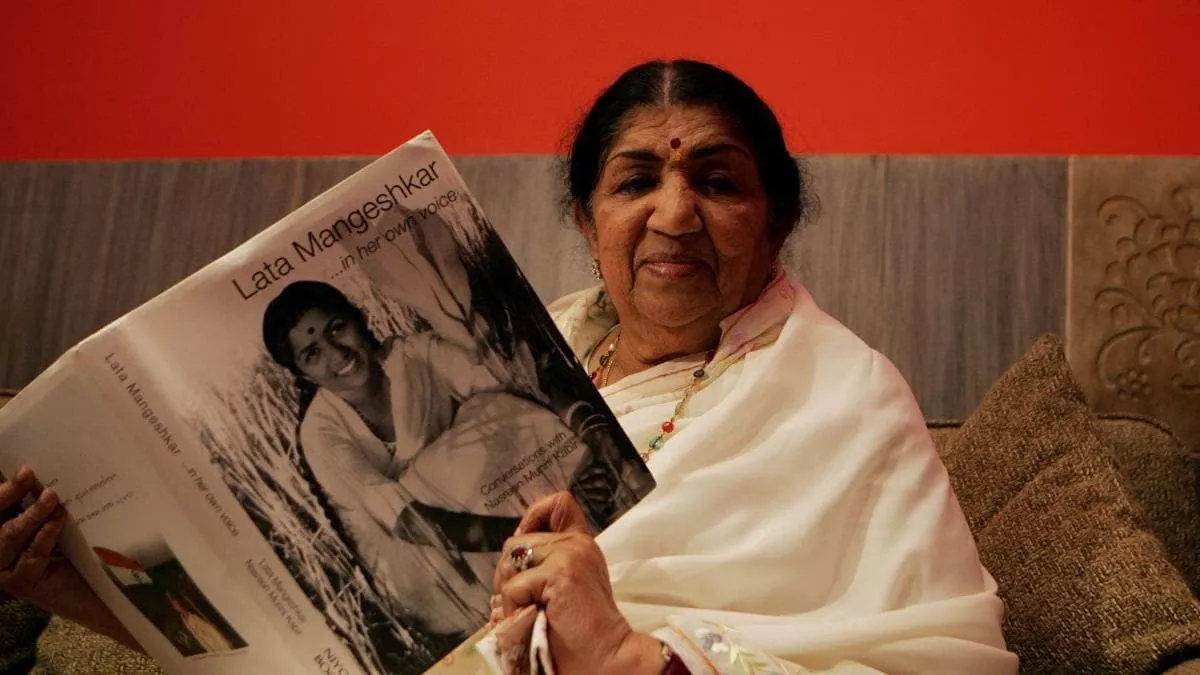Farewell, Nightingale: The life and legacy of the inimitable Lata Mangeshkar
Dominating airwaves for over half a century, her vocals are largely considered synonymous with Hindi film music
Lata Mangeshkar, 92, dubbed the “Nightingale of India” due to her unparalleled musical contribution to the Indian film industry, passed away on Sunday after a period of hospitalisation. Dominating airwaves for over half a century, Mangeshkar’s vocals are largely considered synonymous with Hindi hits.
Her illustrious career took off in the era of black and white cinema, with Mangeshkar lending her vocals to Bollywood songs alongside the likes of celebrated singers such as Mohammed Rafi and Kishore Kumar. From Mughal e Azam and Pakeezah to Dil Wale Dulhaniya Le Jayengay and Veer Zara, the iconic playback singer leaves behind a massive list of credits to her name and an undeniable impact on the trajectory taken by Hindi film music post-Partition.
Lata Mangeshkar: Unparalleled
Mangeshkar was born in 1929 and started her musical training early under the tutelage of her father Deenanath, singing in his theatrical productions when she was just five. Her father's death when she was only 13 forced her to take on the role of breadwinner to support four younger siblings, and the family eventually moved to Bombay, later renamed Mumbai, in 1945.
Forced by circumstance, with there being a shortage of singing opportunities in film early on, Mangeshkar turned to acting. Her acting career was brief, spanning a total of eight Marathi and Hindi films.
The singer spoke about her distaste for acting in one of her final interviews with The Quint. She shared, “Surprisingly, I was quite confident before the camera. It was just that I hated acting. I felt like a doll on being told, ‘Abhi tum hanso, abhi tum aansoo bahao [Now you laugh, now you shed tears]’. In a manner of speaking, it was like switching a tube light off and on within me.”
Considered by many to be India’s greatest-ever playback singer, the Ajib Dastan Hai Yeh singer dominated the Bollywood music scene with her sister, Asha Bhosle. She lends her voice to several iconic Hindi film actors, including Madhubala, Meena Kumari and Kajol. Celebrated Bollywood producer and director Yash Chopra, who featured Mangeshkar prominently in his projects, said to the singer once that her voice “can suit the character of an underprivileged woman as well as that of a queen.”
Fight for recognition
Fiercely dedicated to her craft, Mangeshkar was the first playback singer to demand better pay and royalties for her music. She explained in an interview once, "I am a self-made person. I have learned how to fight. I have never been scared of anyone. I am quite fearless. But I never imagined I would get as much as I have."
The singer was also the first to demand acknowledgment in the film’s credits and record labels, which previously only mentioned the name of the character and not the playback singer. Speaking about her fight for recognition, Mangeshkar reflected, “Without any hesitation, I requested Raj Kapoor to give due credit to all the playback singers. When we sing for the heroine and the hero, why should their characters’ names be mentioned instead of ours?”
Mangeshkar also famously had a falling out with Mohammed Rafi over the issue of royalties, with the latter belonging to the opposite camp. “I initiated the conversation about royalties for playback singers. Mukesh, Talat Mehmood and Mubarak Begum were with me on this issue. Mohammed Rafi, Mahendra Kapoor and some other artistes weren’t,” elaborated the singer, explaining that three years later, the two patched things up and continued working together.
Leaving a legacy
Along with her sister, Mangeshkar was accused time and again of establishing a monopoly over Hindi film music, with newer artists not being able to come to the fore because of the sisters’ hold on the industry. Responding to the same, Mangeshkar said in an interview, “New playback singers would audition before the composers. And the gun would be fired from my shoulder. The composers would claim, “If we give you a song, Lata didi naaraaz ho jaayegi.” Angry? Absurd!” She added, “I have enough sanity to know that in an industry which makes the highest number of films in the world, I couldn’t possibly have insisted that all the songs should be given to me.”
On her legacy, Mangeshkar reflected in another interview that she does not believe her music holds the same sway on younger generations. “Nowadays, young people’s attention span is very limited. They do not live in the past at all. It is the era of instant gratification. Everyone wants to live for the moment.”
As her parting words in her final interview, Mangeshkar shared, “I do believe in punarjanam (rebirth). Yet, when I am dead and gone, I certainly do not wish to be born again. Mujhe bhagwan dubara janam nahin de toh achha hai [It would be best if god does not reincarnate me]. One lifetime is enough.”


COMMENTS
Comments are moderated and generally will be posted if they are on-topic and not abusive.
For more information, please see our Comments FAQ